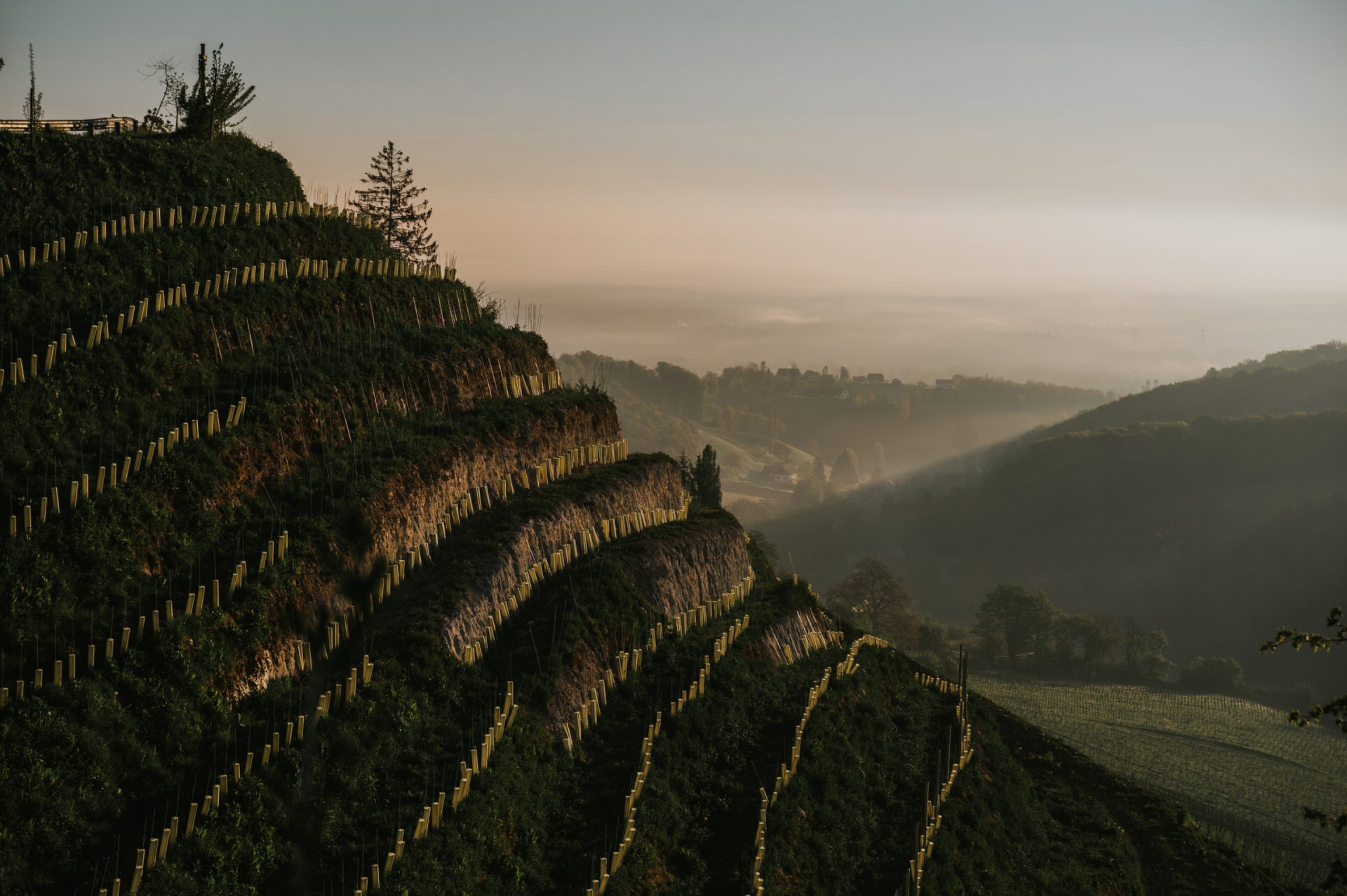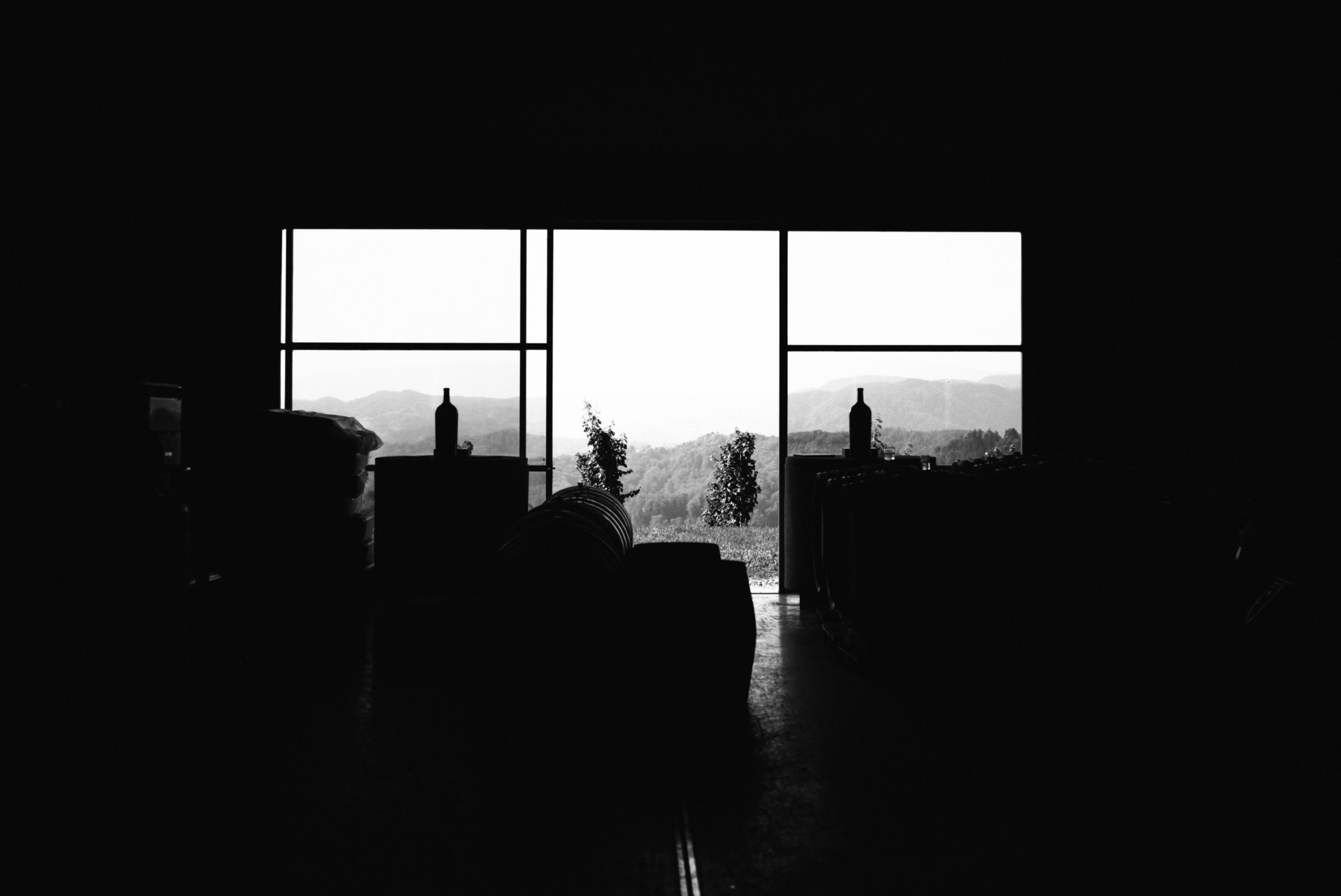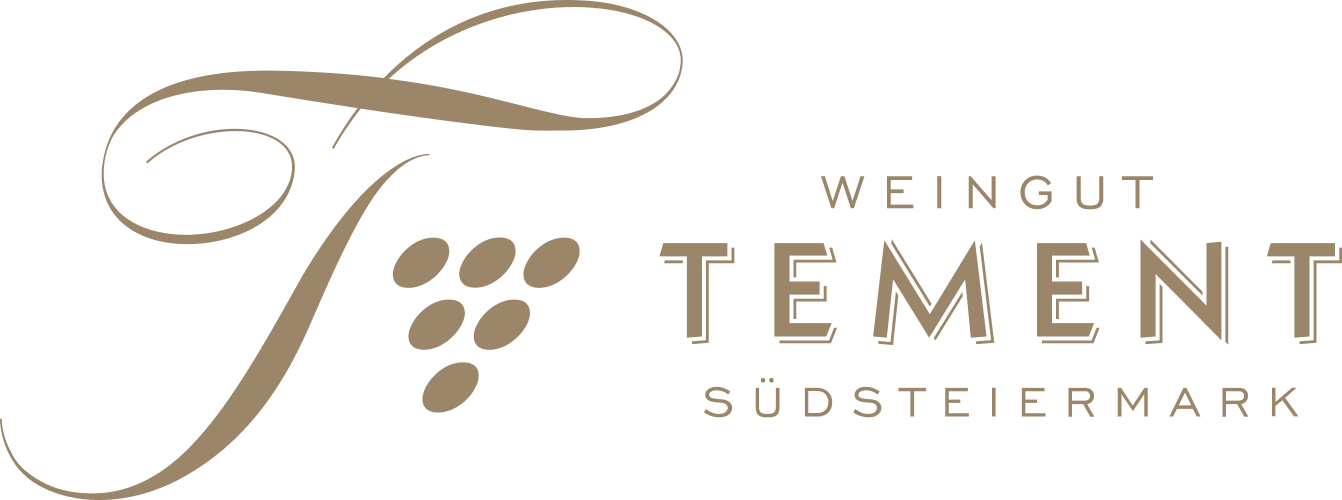Kalender
July 2024
05. & 06.07.2024
Andy Wolf Pop up Tour @ Weingut Tement
September 2024
06. & 07.09.2024
Andy Wolf Pop up Tour @ Weingut Tement
09. & 10.09.2024
Grafenegg Single Vineyard Summit
November 2024
17.–19.11.2024
JRE-Sommeliertag im Schloss Kapfenstein
19.11.2024
Meiningers Finest 100 Neustadt an der Weinstraße
June 2025
14.–24.06.2025
STK Jahrgangspräsentation am Weingut Frauwallner
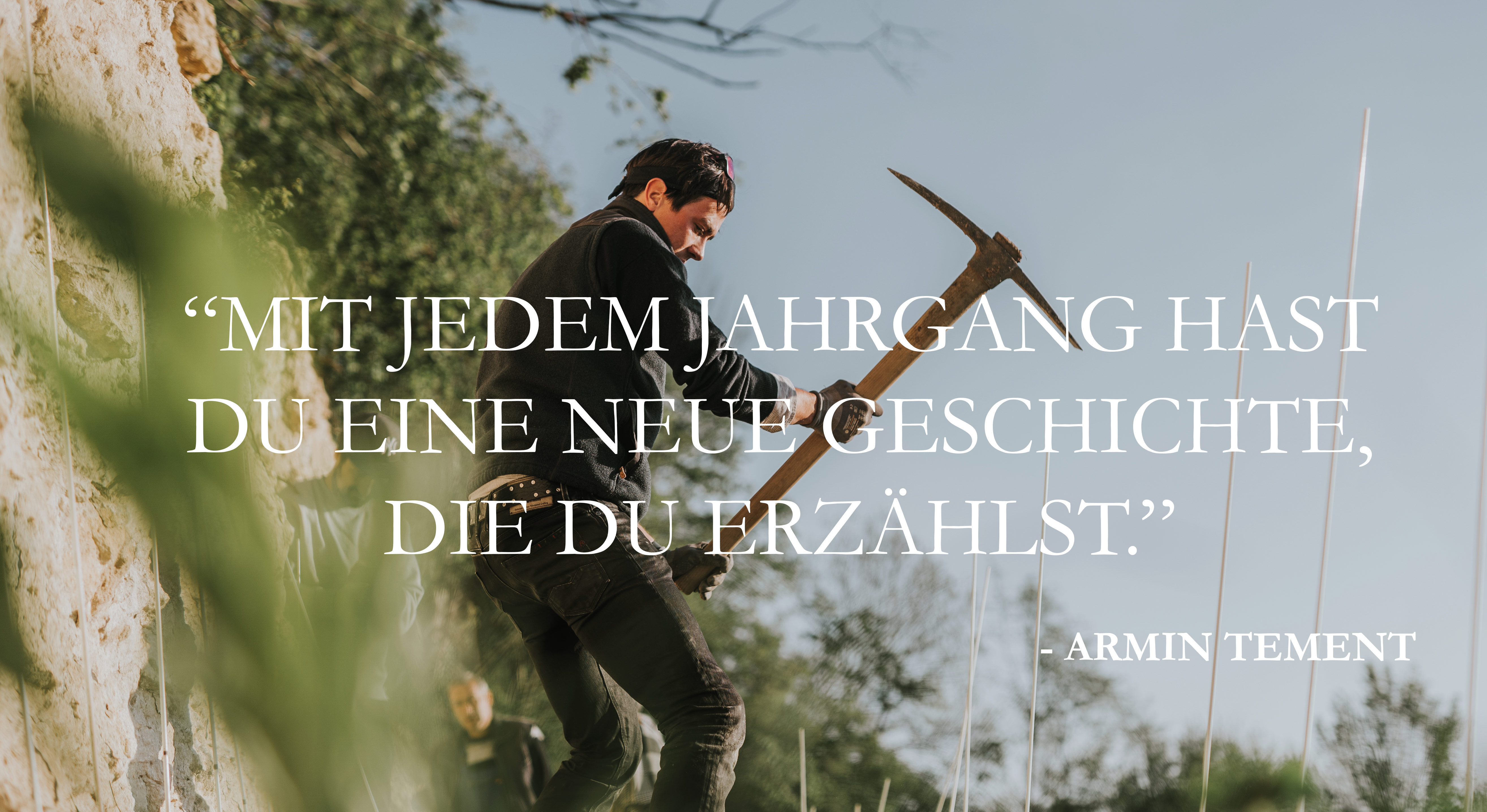
Podcast I Land schafft Leben : Armin Tement & Hannes Royer
An eighth origin with Armin Tement and Hannes Royer – In the podcast: If you don't know, you have to eat everything
© Land schafft Leben
Ganze Folge auf Youtube ansehen:
© Land schafft Leben
Winzerlegenden Episode 1: Väter
#winetime at primetime: ServusTV visited us for the new series "Winzerlegenden." Watch episode 1 – "Väter". Picture (C) ServusTV, Degnfilm
© ServusTV, Degnfilm
Behind the Scenes
Welcome to our world: Our new promotional video reveals who we are and what drives us.
Our wines want to touch, that is not without risk.
Manfred Tement
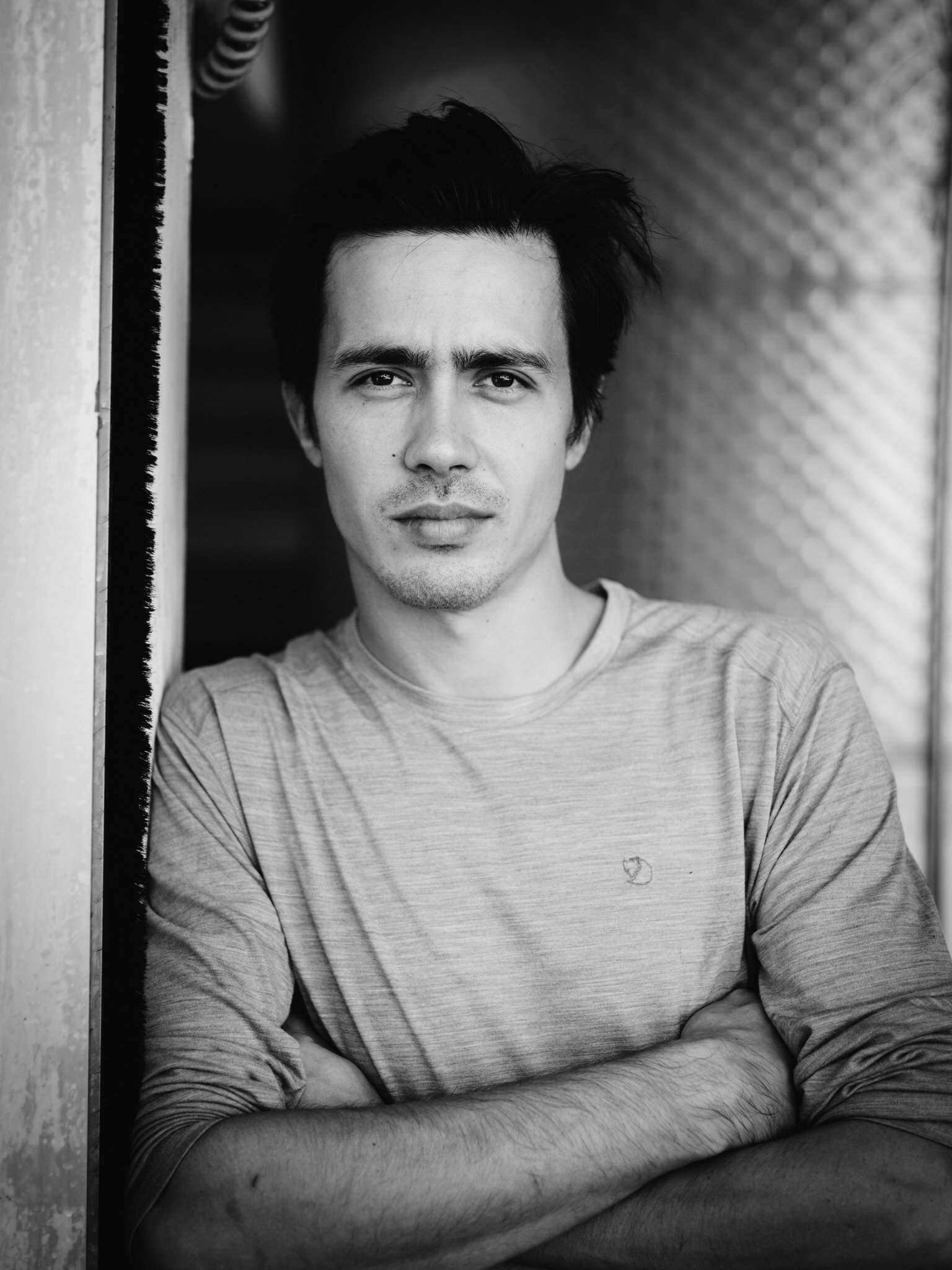
On intracellular fermentation „IZ“
My father was always highly interested in the question of how to achieve the greatest possible expression of origin in a bottle of wine. To deliver all the information about that vine's journey through the year.
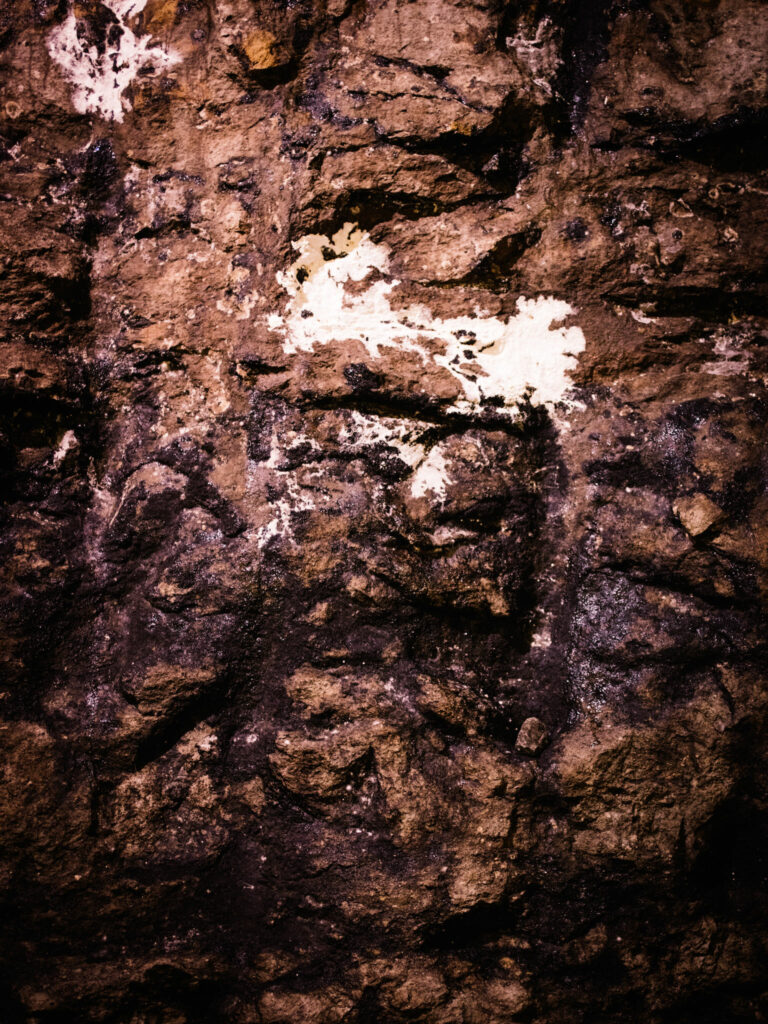
My father was always highly interested in the question of how to achieve the greatest possible expression of origin in a bottle of wine. To deliver all the information about that vine’s journey through the year. In 2005 we struck upon the concept of intracelluar fermentation. We had already tried a number of different fermentation techniques, including extended maturation in a time when the term “orange wine” was still unknown. Intracellular fermentation absolutely opened up our eyes and encouraged us to learn about an entirely new side of the win, not to mention forced us to reconsider all of our preconceived notions.
Each berry is plucked by hand. One person can pick about ten kilograms per day. The healthy berries are then fermented for approx. 100 days. After pressing, the wine then ferments a second time in the barrel. That is both the slowest and most reduced form of fermentation. It can take up to five years before we consider it ready for release. The 2012 vintage offered a fascinating exhibit for how the technique impacts coloration. During that first year the wine was dark brown, almost black. By the time the second year arrived, it had faded to orange; that became gold in year three and gained clear green hues in the fourth. As if the clock were ticking backwards. Like the famous film about Benjamin Button.
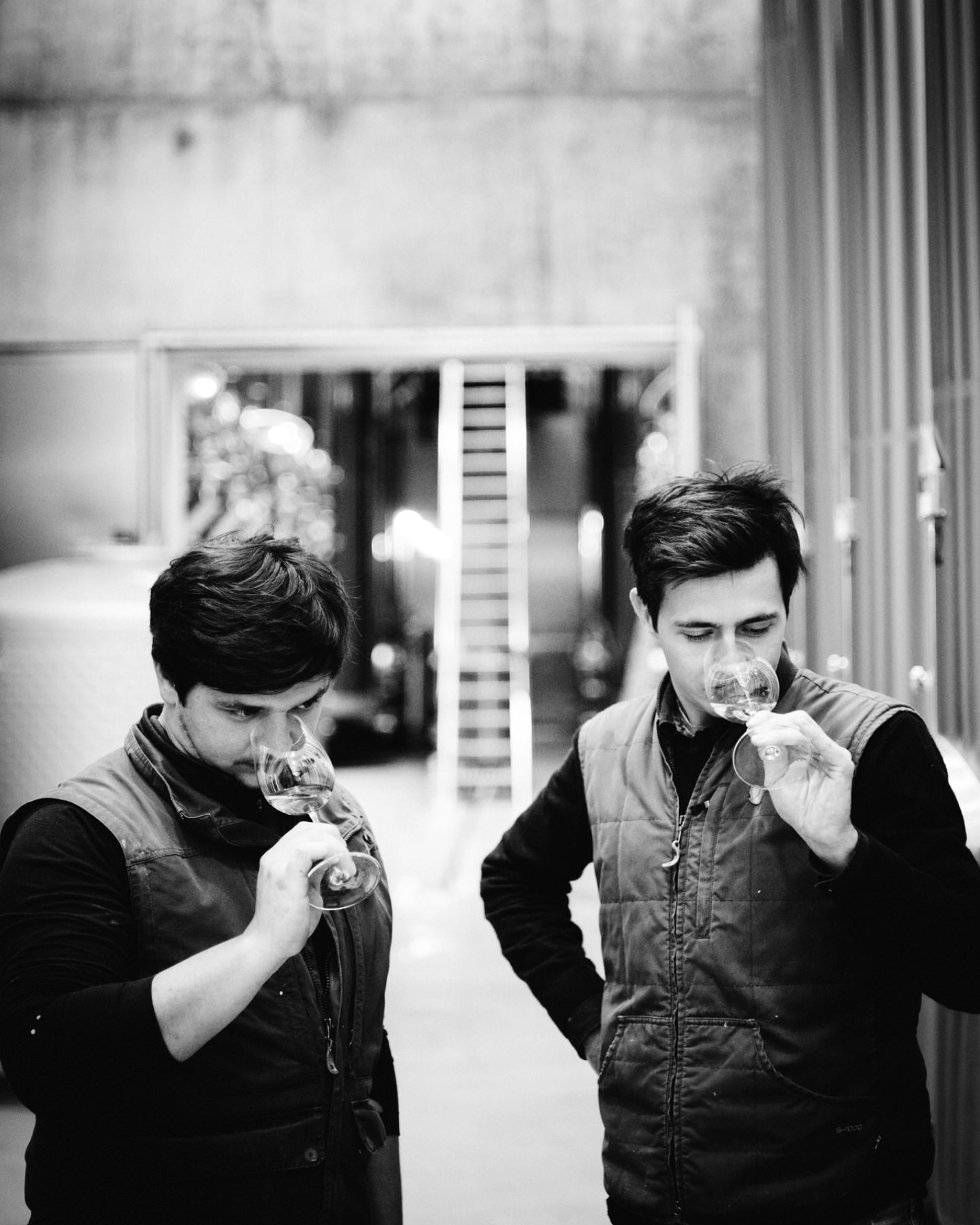
#Brothersinwine
A conversation between brothers. About what connects them and what divides them. After all, sorting out one's own world serves as a new beginning, to improve one's own perspective.
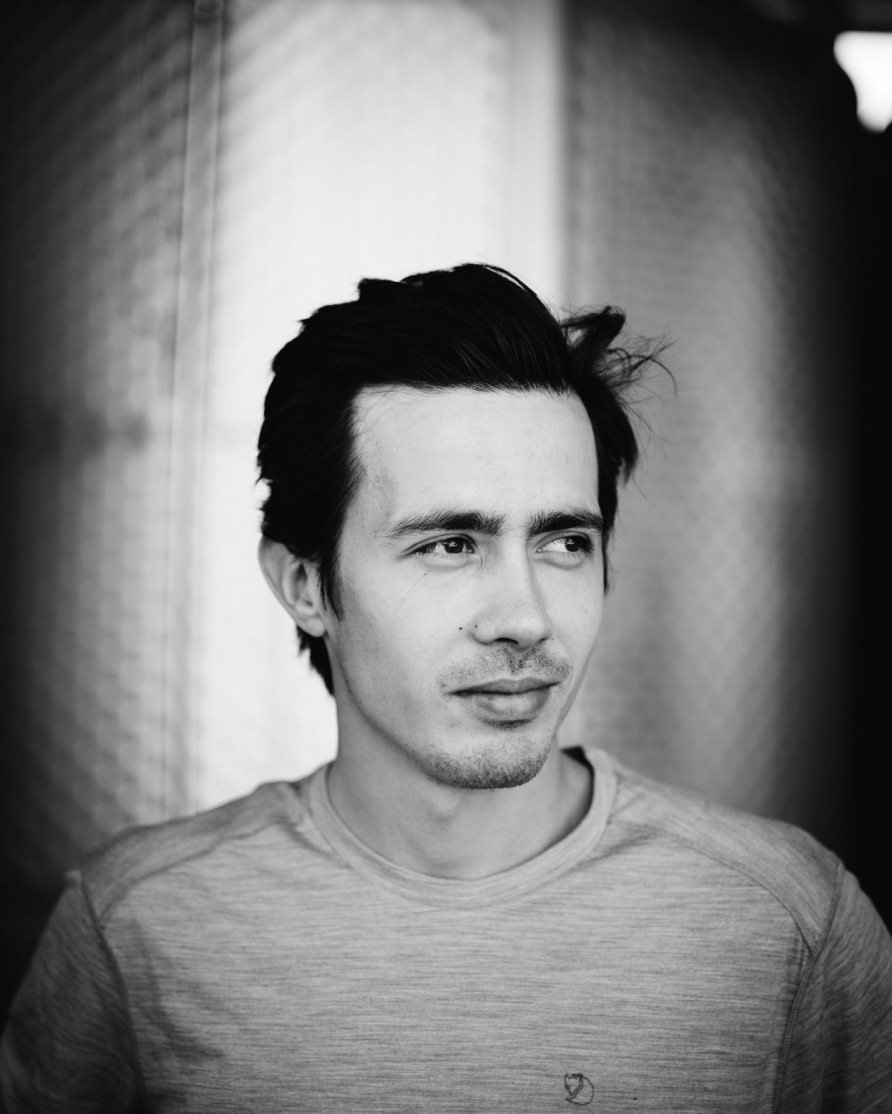
How would you describe each other?
Armin
Stefan has an uncanny feel for nature and technology. An apparent contradiction and a skill that I admire very much. Everything he does has a practical and logical approach. Stefan thinks his way around, tries it out and understands. He is uncompromising and free from any doubt.
Stefan
Armin’s strengths lie in his visions. He knows how something can work and then implements it. It’s a real gift. In addition, he has a great feeling for the wine and the vines, but also for the people.
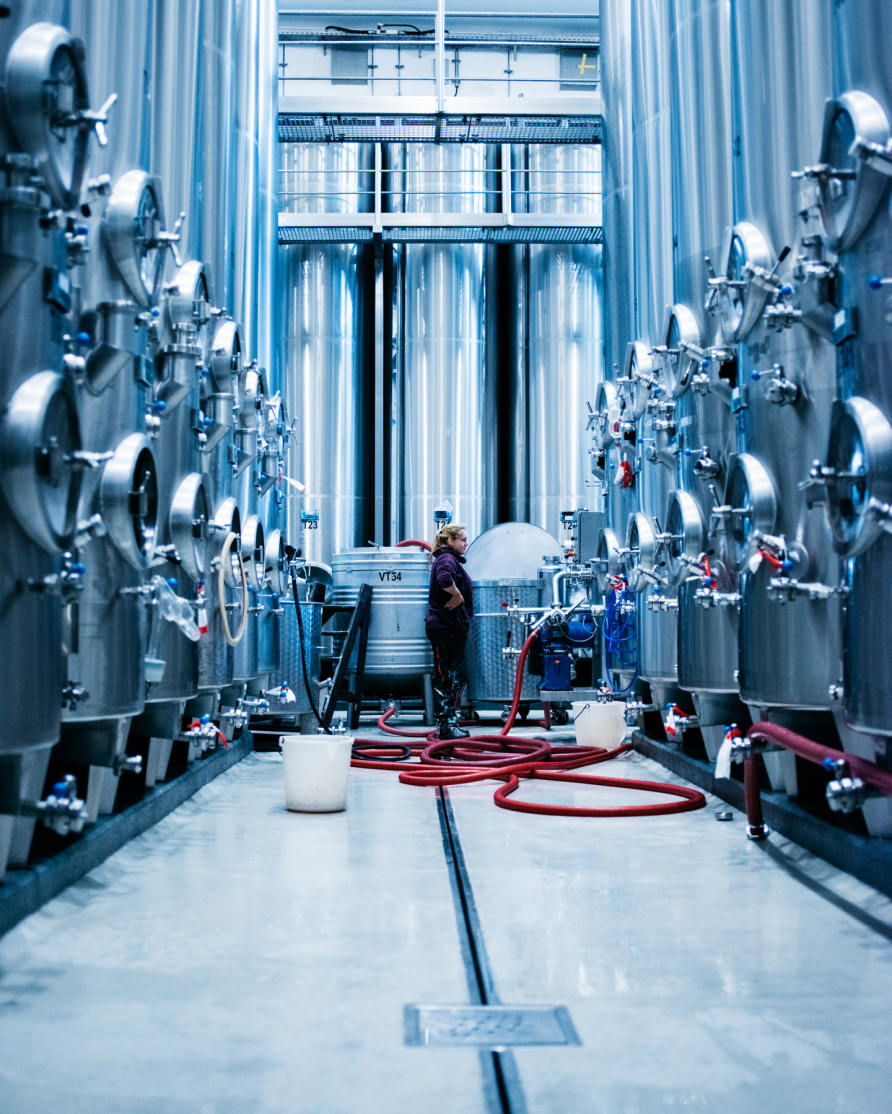
Are you exchanging ideas, or are things now running in silence anyway?
Armin
We are the closest confidante, talk about everything and discuss a lot. Also about things we wouldn’t talk about with others. That means we have secrets (smiles). In such a close relationship, however, it is not always easy to accept that the other can do something better. He has the last word with us.
What is your vision for the future?
Stefan
You’re never finished, because development is a constant process. We have the big change of direction behind us, now it’s more and more about fine-tuning and about getting even better.
Armin
Those who are in constant contact with themselves and their world change unconsciously. What our parents created is the foundation. What they have built would no longer be feasible by today’s standards. For us it is about preserving without living in the past.
Achievements and Awards
Anyone who knows us knows that it is by no means our way of talking about successes. This time we are deliberately making an exception.
Anyone who knows us knows that it is by no means our way of talking about successes. This time we are deliberately making an exception.
Because it is about the work of three generations. And what was laid down decades ago and is continued today with great care.
Some years make you humble because nature shows you your limits, or because you receive awards that are the result of many years of hard work. Work that you have not done alone and that would not be possible without the help of colleagues, friends and family. The successes in this article have therefore many mothers and fathers, we want to say THANK YOU to them.
When Stephan Reinhardt, the responsible taster at Robert Parker Wine Advocate, awarded his points, it was clear to us that we would do well. It was the same in previous years and we were able to assess ourselves so well. However, we were surprised that 5 of our wines were awarded top ratings including the 100 mark. Sentences like the following leave us speechless and grateful. Because recognition comes from a profound point of view and because within this framework you can measure yourself against the best in the world.
“I don’t see anybody else producing wine on this level in Austria, and even in other Germain-speaking countries, there is perhaps only Markus Molitor from the Mosel on those hights. Tement’s beautiful 2018s, and namely the phenomenal 2017 grand crus, should be mentioned among the world’s finest white wines. The mind blowing 2015 IZ, thought has the potential to score the full 100 points one day, als also, among the 2017 Zieregg single-plot selections (the first since the 2015 premier releases), hardcore terroir freaks can find Sauvignons that set a new level for wines from this grape variety.”
Expressed in points:
- 2015 Ried Zieregg IZ Reserve 97-100 RP
- 2015 Ried Zieregg SB Spätfüllung 97-98+ RP
- 2017 Ried Zieregg SB 97+ RP
- 2017 Ried Zieregg Parzelle Karmeliten Kapellenweingarten 2017 96-98 RP
- 2017 Ried Zieregg Parzelle Hausweingarten 96-97 RP
- 2017 Ried Zieregg Parzelle Steilriegel (unterer) 96-97 RP
- 2017 Ried Grassnitzberg SB 97 RP
- 2015 Ried Grassnitzberg Reserve 95+ RP
- 2017 Ried Zieregg Morillon 95 RP
- 2017 Ried Grassnitzberg Morillon 94-95 RP
- 2017 Ried Sernau SB 94 RP
- 2017 Ried Rossberg Morillon 93 RP
- 2017 Ried Sulz Morillon 93 RP
- 2017 Ried Zieregg TBA 93 RP
- 2017 Ehrenhausen Muschelkalk 92+ RP
An award that makes you sit up and take notice with its clarity and which, together with other, also highly rated wineries from the region, makes us a vinophile hotspot. Reviews that help to focus on Styria with its extraordinary products and people. & Nbsp;
But that wasn’t the only top international rating that we could be happy about. In July of this year around 500 wine and travel experts met in London and voted for the World’s 50 Best Vineyards. A ranking that assesses not only the wine but also the ambience, i.e. the overall experience. Exceptional & nbsp; places all about wine, tasting and making. The list includes names such as Robert Mondavi, Antinori or Château Margaux, but also insider tips and small boutique wineries or houses with connected gourmet restaurants. We are all the more pleased that we have landed at number 15 in this exquisite list. With Schloss Gobelsburg and the Wachau domain, there are two other Austrian wineries among the winners.
These are successes that make us proud despite their modesty and that we have received on behalf of our family, which also includes our employees. Without their unconditional commitment and the desire to continuously develop the winery, that would not have been possible.
Things change, what remains is the desire to do the best. The best of what is entrusted to us. We want to keep it that way in the future.
Text: Barbara Klein
Bilder: Ingo Pertramer
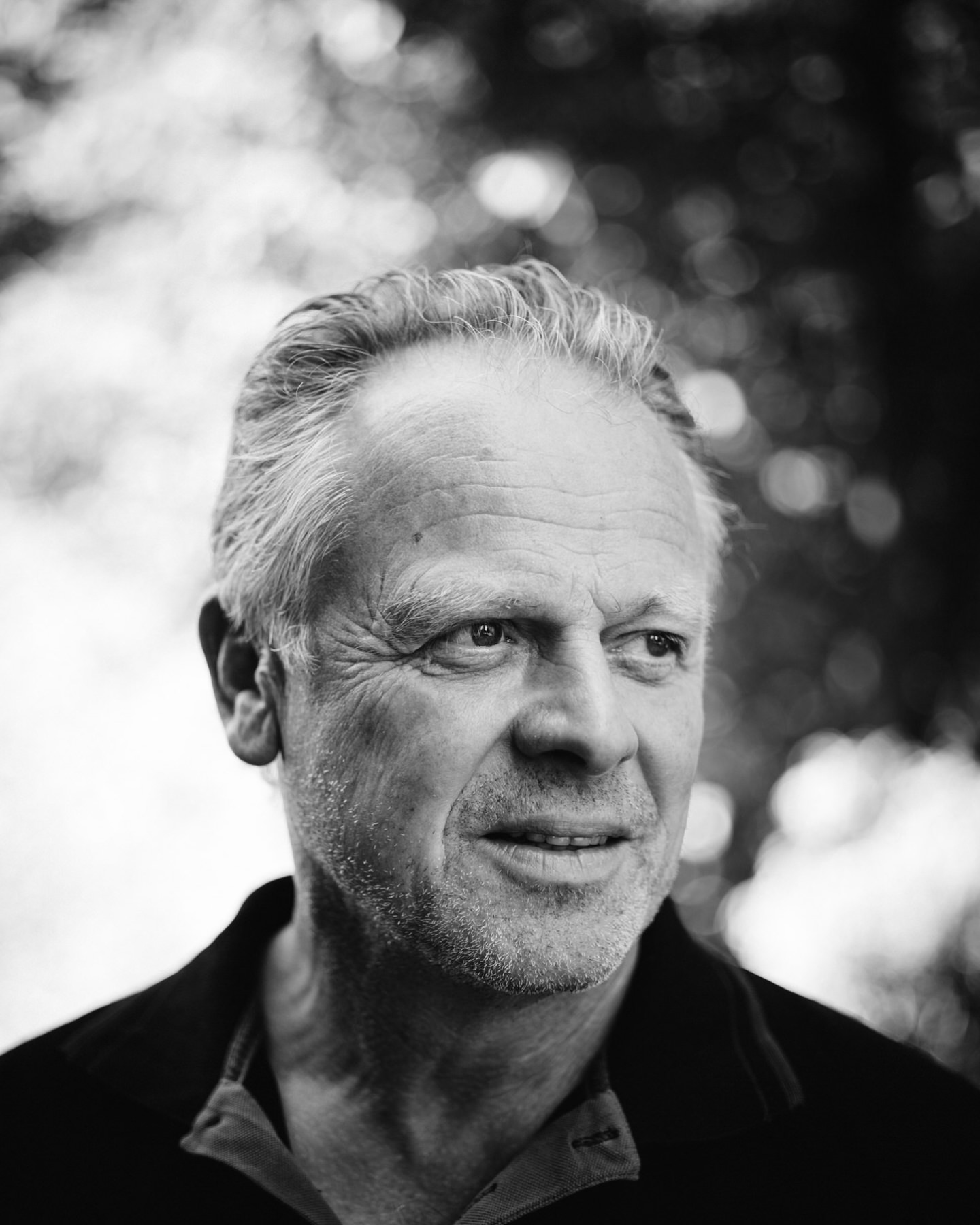
Manfred Tement
He's the one who started it all and he's still on fire. For his family, Styria and his idea of Sauvignon Blanc.
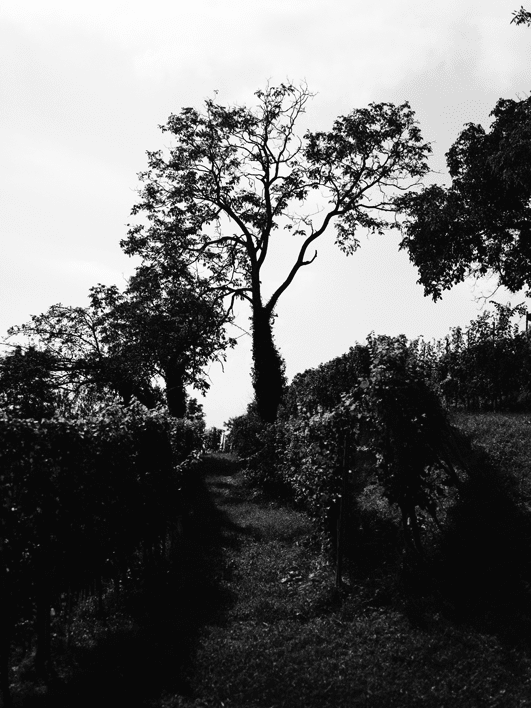
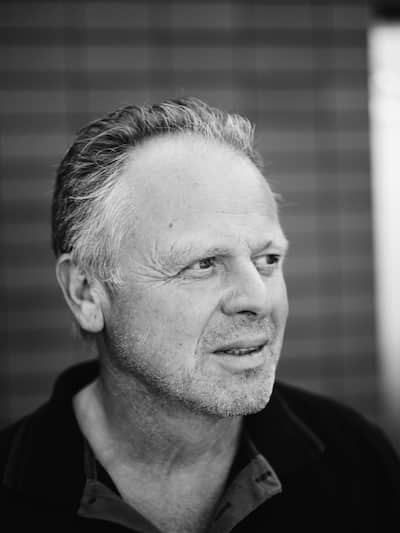
Manfred, we are sitting here in the middle of your vineyards. How does it feel when you consider that you started small over 40 years ago? What was and is your personal drive?
It may sound strange, but my drive has hardly changed over the years. My father made the business attractive to me. Even then he had a strong sense of quality, even though the wines were sold in liter bottles. I have the appreciation of the product and other wine regions from him. Even then, we drank a good bottle of wine with our meal every Sunday. Wines that my father brought and that were discussed afterwards. We have looked outside the box. & Nbsp;
You then went to Klosterneuburg and further refined your understanding of wine. How can you imagine that?
My father chose the school in Klosterneuburg for me. The apprenticeship was intended as a safeguard in case I couldn’t make it with my own company. When my father suddenly died, the fear of not being able to make it was my greatest motivation. I wanted to show him that it was possible.
Who or what inspired you?
It was a different time. I had to teach myself a lot. There was a completely different understanding of quality. The wine was – like the schnapps – a product that was not held in high esteem. You had no problem with processing bad grapes. But I was of the opinion that you should only process what you eat. I just wanted to process food quality. The difference was quickly noticeable to people. The rise to a quality winery then went pretty quickly.
Were there any other criteria for success apart from & nbsp; quality? & nbsp;
I realized relatively quickly that marketing is at least as important as winemaking. Our little wine tavern laid the foundation for this. Because of the quality offered there, we got good people. People experienced wine and food as a unit. The spark quickly jumped over there, outside of the own company it was much more difficult. The flagship businesses in gastronomy, above all Willi Haider with the “Stündl in Graz and Heinz Reitbauer senior in Vienna, helped me and the wines. This made us nationally and later also internationally visible.” My father made the business appealing to me. When he died unexpectedly, I wanted to show him that I can make a living from my idea of making wine. “
It all happened incredibly quickly. Did you still have a sense of the pace yourself?
Back then I was frankly taking everything I could get. At some point the success story took on its own momentum. In the beginning I even put up posters to sell my wines to the people. You can no longer imagine that today. Back then, the whole campaign brought me a single customer. That was a so-called “delivery point” in Carinthia. A cider bar that got 1000 liters of wine every 3-4 months. That was pretty neat. But because people stopped drinking cider, they stopped doing it. & Nbsp; (smiles)
40 years is a long time. You experience a lot, make decisions every day. Some affect you only & nbsp; yourself, while others affect the entire system. & Nbsp; Would you & nbsp; do it all over & nbsp; exactly & nbsp;
By and large, yes! However, one cannot transfer the time then into the now. If I started today, there would be other conditions and options. When I started, no one drank a single wine out of eighth glasses. The Wildon carpenter and later operator of the Jaglhof, Herbert Hirtner, made it clear to me in 1981 that we still have a lot to do. What I was doing back then was maybe good drinking quality, but nothing more. Just because someone makes a good schnitzel doesn’t mean they’re a good cook. A lot has happened since then. Still, it hasn’t got any easier.
Is there really nothing you would change?
(thinks briefly)
I would only rely on Sauvignon Blanc. One grape variety is enough. At that time I listened too much to other people who said Sauvignon Blanc alone wouldn’t work. Today I would pull this off. No ifs or buts. & Nbsp;
Where does this consistency and the special relationship with Sauvignon Blanc come from?
I realized very early on that this grape variety was the best for the region. You could create quality and set yourself apart from other regions. As far as the shelf life of these wines is concerned, we are still unmatched. Sure, you could also make a great Burgundy, but you can also find it elsewhere. & Nbsp; “If you want to be successful, you mustn’t listen to what the crowd is doing. That’s why you’re always a little lonely if you’re ahead of your time. “
You are currently working on the Zieregg & nbsp; very small-scale. As a result, knowledge about Sauvignon Blanc is enormous. Doesn’t that also increase the desire to experiment?
Everything is possible in terms of production technology. You definitely stay curious and enjoy your work. In terms of marketing, it looks a little different. You have to think about whether you can even market it in such a small way. Because in the end the consumer has to understand the wines. So sometimes it would be & nbsp; better if you only had two wines in the range. & Nbsp; (laughs) & nbsp; The small parts and the concentration on one grape variety have without question led to an excellence. The resulting potential is enormous. & Nbsp;
A brand like Tement is always on the move. Armin, & nbsp; Stefan and you are strong characters with very different & nbsp; points of view. Where is the & nbsp; company developing?
We try to make collaborative decisions. Only if they do not tolerate delay and a delay would only damage operations do you often have to act alone. In my case, this mainly affects the vineyard. When the grape is in danger, there is no time for discussion. It’s different in the basement.
How important are the different connections within a family?
I was always used to doing everything with myself. I hardly allowed comparisons with others. Today the boys are the ones who are allowed and must develop. I would like to support you in this. They should be able to do what they have in mind. I only intervene if I fear harm to the family or the company. & Nbsp;
What about fundamental decisions, such as switching to organic farming?
If it had been up to me, I would not have made the change all at once. For my sons that was the path they wanted to take with all consistency. We have been preparing for this step for many years. We had to be stable, otherwise we wouldn’t have done it. & Nbsp;
Have you ever doubted the change?
Certainly there were phases that were difficult. Then when you can barely hold positions because the climate throws a spanner in the works. In the long term, we will no longer cultivate this area. That wouldn’t make any sense. After all, we don’t want a mediocre result with the greatest possible effort. We do a lot of things right, but we certainly have to sharpen some things up. & Nbsp; Armin and Stefan can rely on me. They know that I am not only a father but also a best friend to them.
Building a company like this doesn’t just make friends. You are in the focus, you get headwinds and criticism. How do you deal with it and how do you keep the really important things in focus?
It is important that you remain true to yourself. At first, people didn’t like what I did when I was young. But if you want to be successful, you mustn’t listen to what the crowd wants. Armin is no different today. Our wines have been consistently good over the years, which has earned us confidence and allowed a few experiments. A head start in trust that helps us to develop further. The simpler a wine is, the less willing customers are to go along with a company, the more complex it is, the more likely it is that one encounters understanding for what one intends to do. You just have to explain it. Just doing it and leaving the consumer alone would be the wrong approach. & Nbsp;
You still have a lot to do and want to develop further. How important is family cohesion?
We talk to each other a lot. Spend time together and are happy when we are together. That cannot be taken for granted and it shows me that we have done some things right. Listening to the other’s opinion is important; it would be wrong to think that you are always right. But it would be just as wrong to hold back with your opinion. When I think about the work my sons do, I remember how I felt back then. I wanted to do my best. There is no “right” or “wrong”, there is only one “different”. I always say to Armin: “You will not find a better friend than me.” & Nbsp;
How are you doing as a father? After all, do you want to protect your children from negative experiences?
The hardest thing being a father is that sometimes you just worry. One should not always articulate this concern, because it is important that the children make their own experiences. I want to accompany and protect my children in what they do. Sometimes I succeed better and sometimes worse. But one thing has always been clear to me: to stand behind what you do one hundred percent. Because if we don’t believe in our work ourselves, how should the consumer do it.
Is there anything you really want to do? An unfulfilled dream, a longing?
Actually, I would like to have a small vineyard to myself. Understand and manage it. But I put this idea on hold for now. Now it’s about supporting my children in their idea of wine. To make sure that your wishes can become reality with all your might. I would like to think Tement through to the end together with you. & Nbsp;
Interview: Barbara Klein
Photos: Ingo Pertramer
Life’s Work Manfred Tement
For his outstanding pioneering work, Manfred was awarded the Vinaria Trophy for life's work in 2016!
For his outstanding pioneering work, Manfred was awarded the Vinaria Trophy for life’s work in 2016!
Wine is not static. It evolves, matures and changes over time.
Armin Tement
